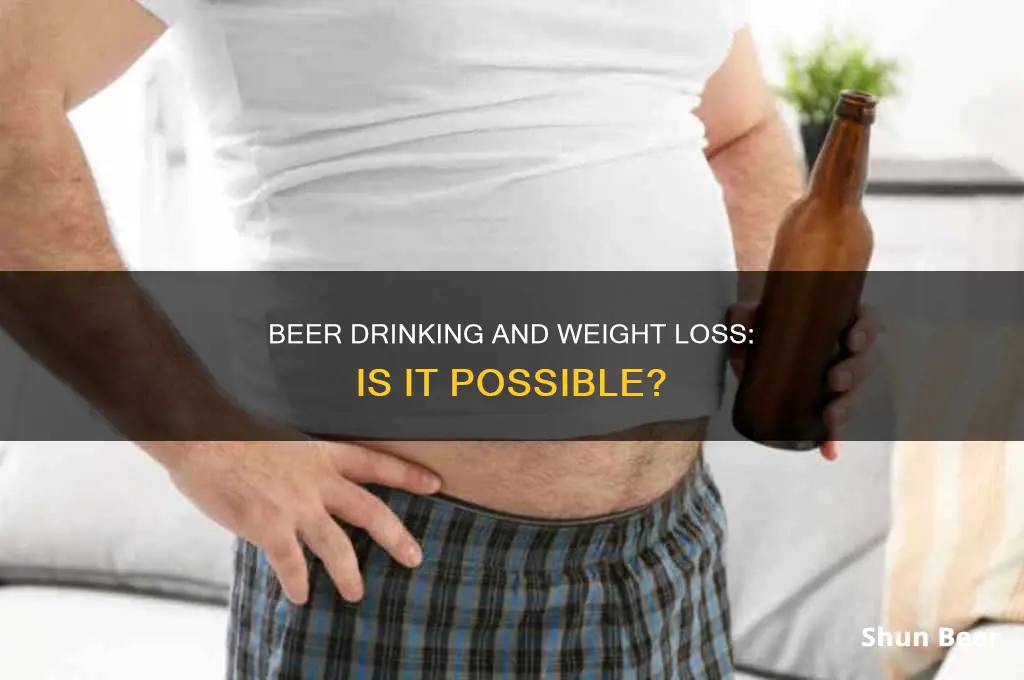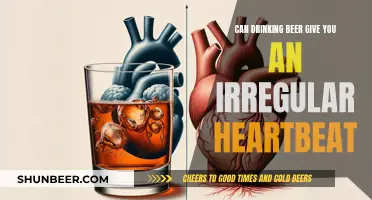
Drinking beer and losing weight is a challenging combination. Beer is often associated with weight gain due to its calorie content and its impact on metabolism and eating habits. Alcohol is high in calories, with a regular beer containing around 150 calories and a craft beer up to 170-350 calories. These calories are empty as they provide almost no nutrients, and drinking beer does not satisfy hunger. Additionally, alcohol can disrupt sleep patterns, increase appetite, and impair self-control, leading to poor food choices and excess calorie consumption. To lose weight, creating a caloric deficit is essential, and drinking beer daily can hinder this process. However, moderate drinking, defined as 1-2 drinks per day for men and up to one drink per day for women, can be incorporated into a weight loss plan with careful adjustments. Strategies include drinking light or low-percentage ABV beers, reducing portion sizes, drinking less frequently, and choosing lower-carb options.
What You'll Learn

Beer is an empty calorie as it provides almost no nutrients
Beer is often referred to as "empty calories" because it provides little to no nutrients. While beer does contain some trace vitamins and minerals, the refining processes used to make modern beers have stripped them of most of their nutritional value.
The calories in beer come primarily from starches and sugars, which are also a prime source of empty calories. These can cause weight gain and malnutrition if consumed in excess. Alcohol is particularly calorific, containing 7 calories per gram, second only to fat, which has 9 calories per gram.
Beer and weight gain often go hand in hand. If you're trying to lose weight, cutting out alcohol altogether or switching to low-calorie beers can be a good strategy. According to the USDA, a regular beer contains 153 calories, while a craft beer can have over 200 calories. In contrast, a light beer typically has 103 calories.
The issue with beer and weight gain is not just the number of calories but also how they are used. Alcohol cannot be stored in the body like other nutrients. Instead, the body prioritises processing and eliminating it, which means it stops burning stored carbs and fat for energy. This can lead to weight gain, as any other calories you consume are more likely to be stored as fat.
In addition, alcohol can reduce your inhibitions and stimulate your appetite, leading to increased food consumption. It can also disrupt your sleep patterns and affect your metabolism, further contributing to weight gain.
Mixing Oxycodone and Beer: What's the Danger?
You may want to see also

Alcohol can stop the process of fat burning
Alcohol can indeed stop the process of fat burning. Within minutes of taking your first sip of a drink, your fat metabolism can wane. Your body treats alcohol as a toxin, and removing it becomes its top priority. This means that your body can stop burning its usual stored carbs and fat for energy and, instead, utilise the alcohol.
The calories from any other food or drink you consume at this time—whether carbs from your beer or protein from buffalo wings—are then stored as fat. A study from Switzerland, published in the New England Journal of Medicine, found that male participants who were given two beers' worth of alcohol with each of their three meals experienced a slowdown equivalent to roughly 450 calories that day.
In a UC Berkeley study published in the American Journal of Clinical Nutrition, people who consumed an ounce of alcohol from two cocktails showed a 73% decrease in fat burning after two hours. The average man needs an hour to metabolise 0.6 ounces of alcohol—the amount in one drink—so even a couple of drinks can have a dramatic effect.
Alcohol also has a depressive effect on your system, slowing down brain function and changing the way your nerves send messages. It can also lead to disrupted sleep, which can cause your body to misfire: you feel hungry when you don't need food, and you make poor diet choices. In a French study, people consumed 560 more calories during the day following just one night of poor sleep than they did after sleeping eight hours.
Drinking Beer Outside: Legal or Not?
You may want to see also

Drinking beer can negatively affect your sleep
When you fall asleep, your body typically cycles through four stages of sleep: three non-rapid eye movement (NREM) stages, followed by rapid eye movement (REM) sleep. During the first half of the night, when blood alcohol levels are high, you are likely to experience more deep sleep (N3) and less REM sleep than usual. However, later in the night, once your body has metabolized the alcohol, you will experience more frequent wakings and fragmented, low-quality sleep. This disrupted sleep architecture is caused by alterations in the neurotransmitter systems that regulate sleep.
Additionally, drinking alcohol can lead to snoring and sleep apnea, a disorder that causes repeated pauses in breathing during sleep. Alcohol relaxes the muscles in your throat, mouth, and nose, which can obstruct your airway and disrupt your breathing. This can further contribute to poor sleep quality and leave you feeling tired and sluggish the next day.
To minimize the negative impact of alcohol on your sleep, it is recommended to avoid drinking at least three hours before bedtime. This will give your body time to process the alcohol and reduce its disruptive effects on your sleep cycle.
Drinking Beer Underwater: Is It Possible?
You may want to see also

Beer may inhibit your self-control, leading to poor food choices
Alcohol can disrupt your sleep patterns and mess with your appetite, leading to a cascade of weight-gaining processes. A good night's sleep is crucial for weight loss and muscle gain. Alcohol can interfere with your sleep quality, causing you to wake up during the night and disrupting your sleep architecture. As a result, you may feel hungrier and crave more high-carbohydrate, calorie-dense foods, making it challenging to stick to a healthy diet.
Additionally, beer provides empty calories without satisfying your hunger. A typical beer contains around 100 to 150 calories, mostly from alcohol. These calories are easily consumed in liquid form, and since beer doesn't fill you up, you may still have room for a full meal afterward. This can quickly add up, making it difficult to maintain a caloric deficit, which is essential for weight loss.
The effects of beer on self-control and appetite can lead to poor food choices. Alcohol stimulates the release of dopamine, enhancing your feelings of pleasure and reward. It also increases the release of ghrelin, an appetite-stimulating hormone, and galanin, a neuropeptide that may lead to increased fat consumption. This combination can result in hyperphagia, or an abnormally increased appetite, making it challenging to stick to a healthy diet or calorie deficit.
To maintain self-control and avoid poor food choices while drinking beer, it's essential to set clear limits on the number of beers you consume per week. Consuming fewer beers means ingesting fewer empty calories. You can also adjust your eating habits by choosing lean protein sources and vegetables instead of high-calorie sides when drinking beer with your meal. Additionally, drinking water alongside beer can help slow alcohol absorption, reduce the risk of an appetite meltdown, and make you feel fuller, potentially leading to better food choices.
Beer and Periods: Is It Safe to Drink?
You may want to see also

Drinking beer can be part of a healthy diet if you stick to the recommended intake
Drinking beer in moderation can be part of a healthy diet. However, it is important to be mindful of the number of calories in beer and how it can affect your weight-loss goals. According to the USDA, a regular beer contains about 150 calories, while a craft beer can have 170 to 350 calories. Light beers have fewer calories, typically around 100, and lower-carb beers can aid in weight loss.
When trying to lose weight, creating a caloric deficit is essential. Beer can contribute a significant amount of calories, especially if consumed daily. To include beer in your diet while losing weight, consider drinking light or low-percentage ABV beers, reducing portion sizes, and limiting drinking to a few days a week. Additionally, choosing lower-carb beers can help, as beer brewing and the resulting ABV and carb content determine the caloric content.
Moderate drinking is defined as one to two drinks per day for men and up to one drink per day for women. It's important to note that drinking alcohol can stop the process of fat burning and negatively impact sleep quality, which is crucial for weight loss. Lack of quality sleep is linked to weight gain and muscle loss, and alcohol can disrupt sleep patterns.
To incorporate beer into a healthy diet, it's crucial to adjust eating habits accordingly. Consuming beer with a meal may lead to increased food intake, so pairing beer with lean protein sources and vegetables is advisable. Additionally, drinking beer in moderation and being mindful of the number and type of drinks can help maintain a healthy balance.
In conclusion, drinking beer can be part of a healthy diet if consumed in moderation and complemented with appropriate eating habits and lifestyle choices.
Beer and Pot: Mixing, Matching, and Safety Tips
You may want to see also
Frequently asked questions
It is not recommended to drink one beer a day if you are trying to lose weight. Beer is high in calories and can cause weight gain. If you are trying to lose weight, it is best to cut back on alcoholic drinks or drink in moderation.
Beer provides calories without satisfying your hunger. It is an "empty calorie" drink that provides almost no nutrients. Drinking beer can make it challenging to eat fewer calories than you burn.
If you want to drink beer and lose weight, you can try drinking light or low-percentage ABV beer, reducing your portion size, or drinking less frequently. You can also choose lower-carb beers if you are cutting carbs.
Drinking beer at night can negatively impact your sleep quality and duration, which is directly linked to weight gain and muscle loss. Beer can also lower your inhibitions, leading to poor food choices and increased food consumption.







